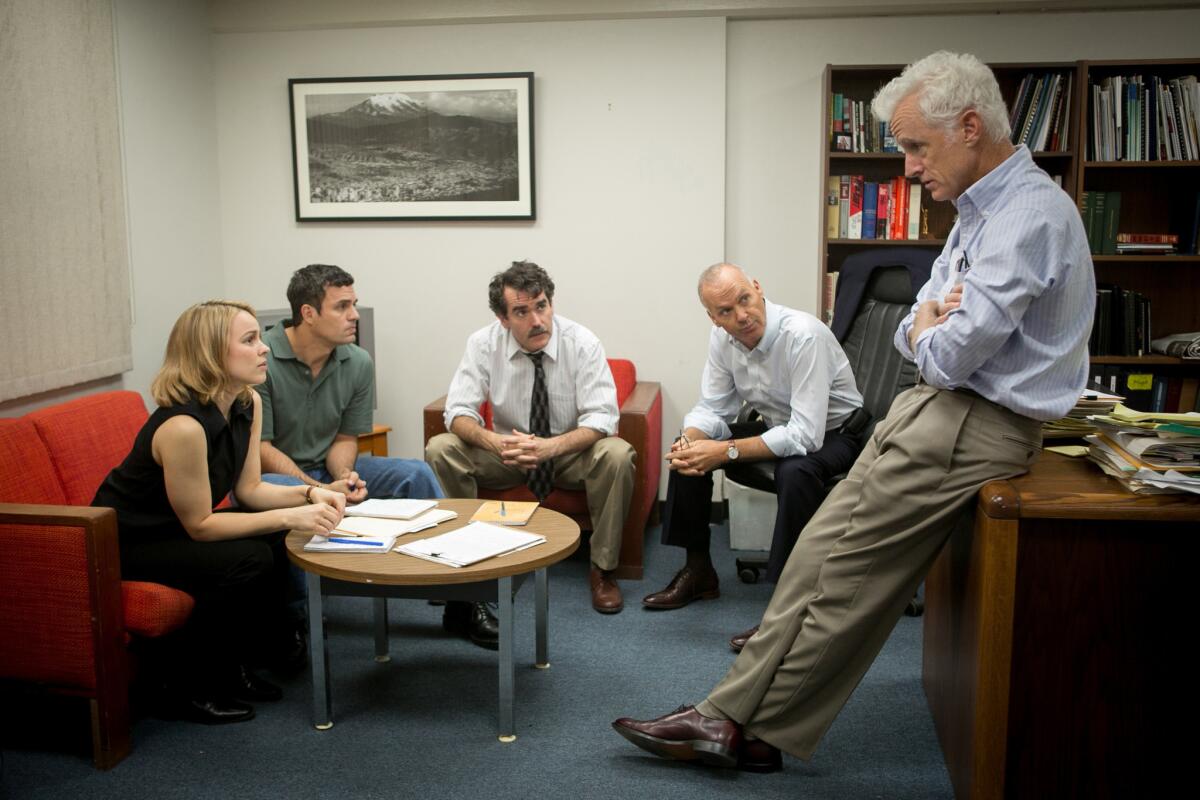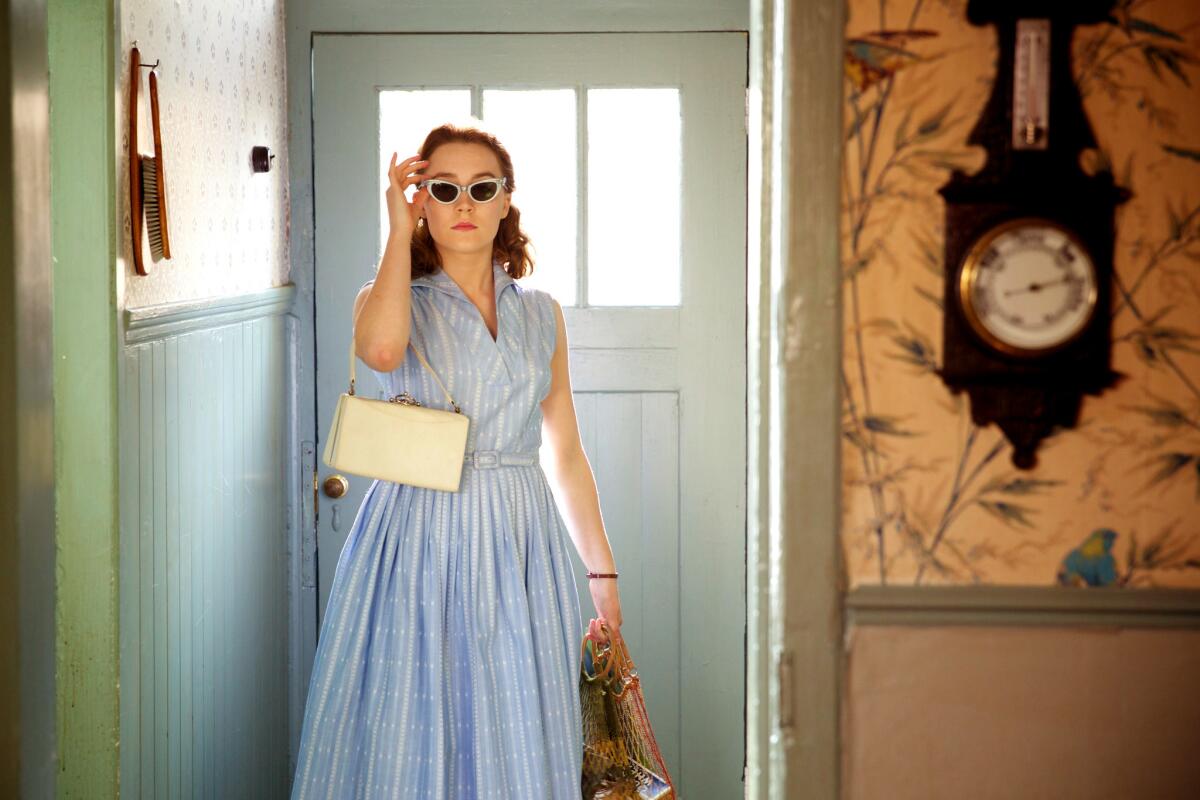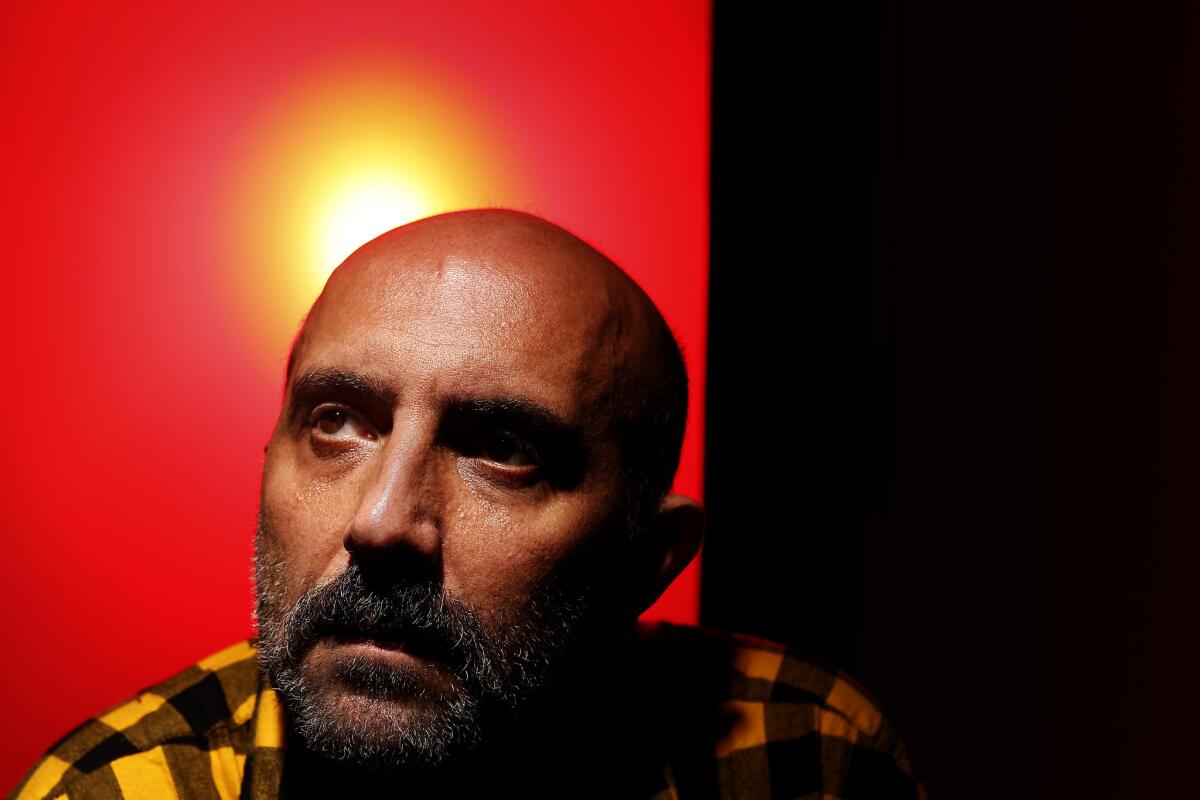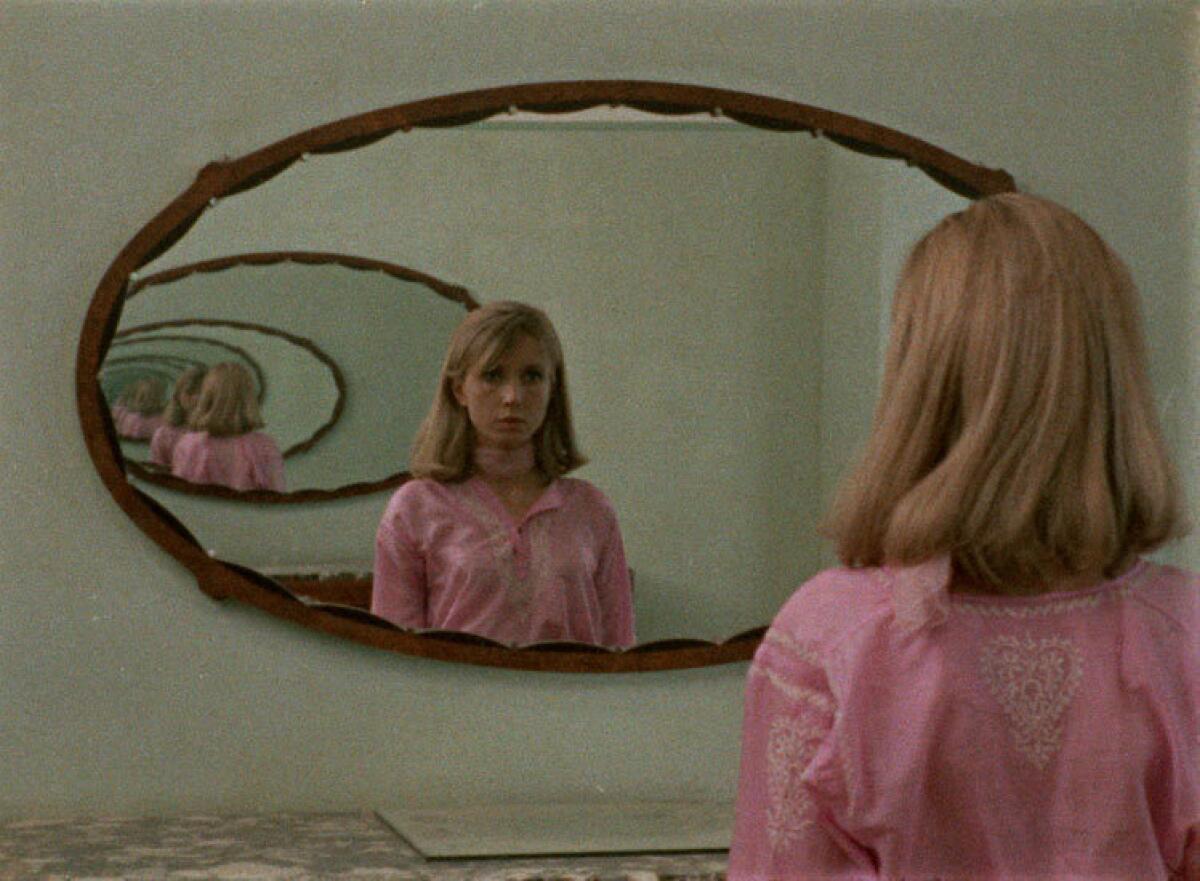Newsletter: Indie Focus: ‘Spotlight’ and ‘Brooklyn’ celebrate the hard work of simplicity
- Share via

Indie Focus logo for the newsletter
Hello! I’m Mark Olsen, and welcome to your weekly field guide to a world of Only Good Movies.
The AFI Fest is in full swing right now and I cannot emphasize enough just how strong the lineup is this year. In pretty much every time slot on any day there is something exciting to see. Upcoming highlights include Todd Haynes’ “Carol,” Hong Sang-soo’s “Right Now, Wrong Then,” Pablo Larrain’s “The Club,” Charlie Kaufman and Duke Johnson’s “Anomalisa,” Paolo Sorrentino’s “Youth,” Jia Zhangke’s “Mountains May Depart,” Jacques Audiard’s “Dheepan” and Adam McKay’s “The Big Short.”
This week I’ll be moderating a couple more Q&As with international filmmakers. On Tuesday we have “11 Minutes,” Poland’s submission for the foreign-language film Oscar and directed by Jerzy Skolimowski, followed by a Q&A with actress Paulina Chapko.
On Wednesday we’ll have a screening of the film “Mustang,” France’s submission for the foreign-language film Oscar. For the Q&A we’ll have director Deniz Gamze Erguven and cast members Gunes Sensoy, Doga Zeynep Doguslu, Tugba Sunguroglu, Elit Iscan and Ilayda Akdogan.
You can find out more info at events.latimes.com.
And you also can listen to our recent podcast series here.
'Spotlight'
One of the most well-received films of the year so far has been “Spotlight.” A procedural drama about the team of Boston Globe reporters who won the Pulitzer Prize in 2003, the film follows them as they work on a series of stories that uncovered serial sexual abuse among priests in the Catholic Church and the systemic maneuvering to cover it up. The articles had global impact. The movie, directed by Tom McCarthy and with an ensemble that includes Michael Keaton, Rachel McAdams, Mark Ruffalo, Liev Schreiber, Stanley Tucci and John Slattery, makes heroes of its journalists — so it is perhaps no surprise the movie has been so warmly received by the media — but it is also a tribute to craft, hard work and perseverance.

Rachel McAdams, Mark Ruffalo, Brian d’Arcy, Michael Keaton and John Slattery in “Spotlight.”
Rachel McAdams, Mark Ruffalo, Brian d'Arcy, Michael Keaton and John Slattery in "Spotlight." (Kerry Hayes / Open Road Films)
As Los Angeles Times film critic Kenneth Turan said in his review, “McCarthy and his team managed to do what many people, including the journalists depicted, thought was almost impossible. They took a process story, one that is surprisingly accurate about both the physical and psychological ways reporters work, how they tirelessly interview, take endless notes and wade through mountains of material, and he gave it the pace and tension of a police procedural. And they do it without compromising the subtleties of what proved to be a very complicated story.”
In the New York Times, critic A.O. Scott said it is a “somber, thrilling movie and crystallizes its major concern, which is the way power operates in the absence of accountability. When institutions convinced of their own greatness work together, what usually happens is that the truth is buried and the innocent suffer. Breaking that pattern of collaboration is not easy. Challenging deeply entrenched, widely respected authority can be very scary.”
Glenn Whipp recently wrote about the relationship between the actors in the film and their real-life counterparts.
'Brooklyn'
Another of the best reviewed films of the year so far is “Brooklyn,” directed by John Crowley, adapted by Nick Hornby from the novel by Colm Toibin and with a remarkable performance by Saoirse Ronan.
The film follows a young woman in the 1950s as she moves from her small town in Ireland to New York City, where she tries to build a life all her own while fighting a constant pull toward returning home.
It’s funny that so many of the words one wants to use to describe “Brooklyn,” terms such as classic, emotional, straightforward, come across as slight digs or backhanded somehow. They should not. The film is refreshing for its directness.

Saoirse Ronan as “Eilis” in the movie “Brooklyn.”
Saoirse Ronan as "Eilis" in the movie "Brooklyn." (Kerry Brown / Twentieth Century Fox Film Corporation)
Or, as Kenneth Turan put it, “A godsend for audiences who hunger for rich emotion presented with wit, grace and not a trace of sentimentality, 'Brooklyn' illustrates the power of restraint in dealing with poignant, impassioned material.”
In the New York Times, A.O. Scott noted, “But it isn’t that simple, really. And it’s also much simpler. 'Brooklyn' endows its characters with desires and aspirations, but not with foresight, and it examines the past with open-minded curiosity rather than with sentimentality or easy judgment. Its New York and Irish landscapes are both romantic and constricting.”
Kenneth Turan first encountered the film when it premiered at the Sundance Film Festival earlier this year, and even then noted it as something special. Turns out it was special for Ronan too.
"I get very emotional when I talk about it; I hope I'm not going to start crying," she said. "I never had a film affect me like that. It was very much a passion project for all the people involved."
Ronan and Crowley recently participated in an L.A. Times Envelope Screening Series event, and you can watch their post-screening Q&A here.
And Steve Zeitchik recently caught up with Toibin and Hornby in New York.
"Weirdly, it's an act of nerve now to write a movie that makes you feel," Hornby said. "And I don't understand why that is. Why are we scared of a '50s weepie? Why are we scared of a movie that pulls you in and punches you in the stomach?"
'Love'
When it comes to filmmaker Gaspar Noe, you have to accept the bad with the good, and his excesses with his extravagant imagination, and sometimes you wind up with a film like “Love.” Shot in 3-D with explicit depictions of sex, it is intended as a deeply felt exploration of memory and loss, attempting to be emotional and erotic in equal measure.

Director Gaspar Noe just released his new sexually explicit 3D film “Love.”
Director Gaspar Noe just released his new sexually explicit 3D film "Love." (Rick Loomis / Los Angeles Times)
I recently sat down with Noe to talk about the film and his reputation as one of the reigning bad boys of international art-house cinema.
“I guess what’s strange about my movies, the two previous ones were either very druggy or very violent," he said. "So when this one, that’s a melancholy movie, was announced, people thought it would be like 'Caligula' or something really dark, a dark vision of sex. But it’s totally the opposite.”
In his L.A. Times review, Robert Abele noted, “When 'Love' works, Noe achieves a lulling, melancholic frenzy about sex and memory, but the foundation isn't strong enough to make his movie ever seem more than a stereoscopic fermata: one envelope-pushing note held way too long.”
As critic Inkoo Kang put it in the Wrap, “'Love' feels deeply, but not complexly."
'Out 1: Noli Me Tangere'
For a certain kind of movie fan, rarity and obscurity are cherished commodities, as if the struggle to see something is part of its appeal. Which is why Jacques Rivette’s rarely shown 1971 film “Out 1: Noli Me Tangere,” clocking in at nearly 13 hours and with a knockout cast including Jean-Pierre Leaud and Juliet Berto, has long been among the most cherished of movies that very few people have seen.
That is all about to change, as the movie itself will soon be released on home video, allowing for viewings at one's leisure. The Cinefamily will be showing the movie over two days on Nov. 14-15, allowing audiences in Los Angeles a chance to dive into the film head-on. It is among the true movie nerd events of the year, a chance that will rarely (if ever) come around again. Think of it as the ultimate experience in binge-watching.

Actress Bulle Ogier in a scene from Jacques Rivette’s “Out 1: Noli Me Tangere.”
Actress Bulle Ogier in a scene from Jacques Rivette's "Out 1: Noli Me Tangere." (Carlotta Films)
Writing recently about the film for BuzzFeed, critic Alison Willmore explained the appeal of its length: “'Out 1' isn’t a regular movie that just keeps going — it operates at a pace and with a structure that’s brazenly insouciant, not bothering to try to hook you from the start or to set multiple stories in motion. For an audacious amount of time, it just is, unspooling on the strength of a pact that you’re in this together for the long haul, asking you to examine what’s on the screen and determine where the center is, if there’s one at all. Halfway through it’s maddening and feels like a film about nothing. All the way through it’s tremendous and sad and feels like a film about everything. It exists as a whole or not at all."
In the New York Times, critic Glenn Kenny made sense of the film by saying, "What plays out is a cinematic experience of life as performance, performance as life, reality as a construction and reality as someone else’s construction impinging on your own. The pace, which picks up and slows down throughout, is not some kind of perverse challenge to the audience. It is intrinsic to the inescapable atmosphere of the work. The viewer is best off to 'just go with it,' as experienced heads used to say to novice LSD users."
Email me if you have questions, comments or suggestions, and follow me on Twitter @IndieFocus.
Only good movies
Get the Indie Focus newsletter, Mark Olsen's weekly guide to the world of cinema.
You may occasionally receive promotional content from the Los Angeles Times.







